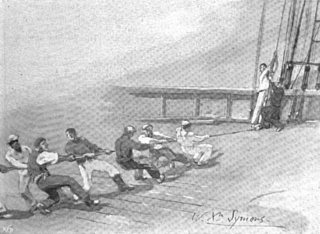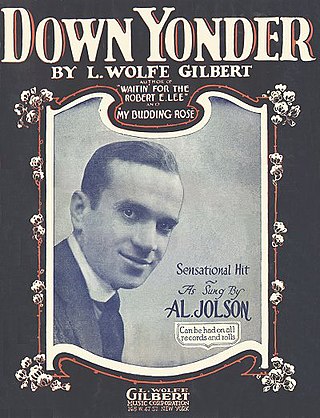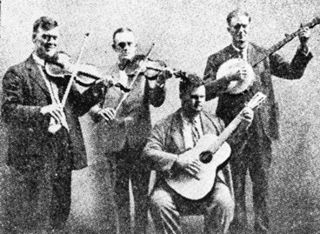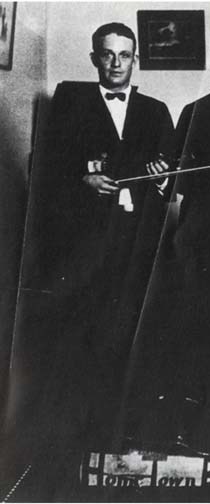
A sea shanty, chantey, or chanty is a genre of traditional folk song that was once commonly sung as a work song to accompany rhythmical labor aboard large merchant sailing vessels. The term shanty most accurately refers to a specific style of work song belonging to this historical repertoire. However, in recent, popular usage, the scope of its definition is sometimes expanded to admit a wider range of repertoire and characteristics, or to refer to a "maritime work song" in general.

"These Boots Are Made for Walkin'" is a hit song written by Lee Hazlewood and recorded by American singer Nancy Sinatra. It charted on January 22, 1966, and reached No. 1 in the United States Billboard Hot 100 and in the UK Singles Chart.
"Cotton-Eyed Joe" is a traditional American country folk song popular at various times throughout the United States and Canada, although today it is most commonly associated with the American South. The song is mostly identified with the 1994 Rednex version, which became popular worldwide. The song is also an instrumental banjo and bluegrass fiddle standard.

James Gideon "Gid" Tanner was an American old-time fiddler and one of the earliest stars of what would come to be known as country music. His band, the Skillet Lickers, was one of the most innovative and influential string bands of the 1920s and 1930s. Its most notable members were Clayton McMichen, Dan Hornsby (vocals), Riley Puckett and Robert Lee Sweat (guitar).
"Ain't Talkin" is a song written and performed by the American singer-songwriter Bob Dylan, appearing as the tenth and final track on his 2006 album Modern Times. As with most of Dylan's 21st century output, he produced the song himself under the pseudonym Jack Frost.

Down Yonder is a popular American song with music and lyrics by L. Wolfe Gilbert. It was first published in 1921, and was introduced in the same year at the Orpheum Theater, New Orleans.

"John the Revelator" is a gospel blues call and response song. Music critic Thomas Ward describes it as "one of the most powerful songs in all of pre-war acoustic music ... [which] has been hugely influential to blues performers". American gospel-blues musician Blind Willie Johnson recorded "John the Revelator" in 1930. Subsequently, a variety of artists, including the Golden Gate Quartet, Son House, Depeche Mode, Jerry Garcia Band, The White Stripes, The Forest Rangers, The Sword, have recorded their renditions of the song, often with variations in the verses and music.
Jack of Diamonds (a.k.a. Jack o' Diamonds and Jack of Diamonds (Is a Hard Card to Play)) is a traditional folk song. It is a Texas gambling song that was popularized by Blind Lemon Jefferson. It was sung from the point of view of a railroad man who had lost money playing conquian. At least twelve artists recorded the tune before World War II. It has been recorded under various titles such as "A Corn Licker Still in Georgia" (Riley Puckett) and "Rye Whiskey" (Tex Ritter).
"Ain't No More Cane on This Brazos" is a traditional prison work song of the Southern United States. The title refers to work assigned to prisoners sentenced to hard labor in Texas. The labor involved cutting sugar cane along the banks of the Brazos River, where many of the state's prison farms were located in the late nineteenth and early twentieth centuries.
"You Ain't Goin' Nowhere" is a song written by American musician Bob Dylan in 1967 in Woodstock, New York, during the self-imposed exile from public appearances that followed his July 29, 1966 motorcycle accident. A recording of Dylan performing the song in September 1971 was released on the Bob Dylan's Greatest Hits Vol. II album in November of that year, marking the first official release of the song by its author. Earlier 1967 recordings of the song, performed by Dylan and the Band, were issued on the 1975 album The Basement Tapes and the 2014 album The Bootleg Series Vol. 11: The Basement Tapes Complete.
This is a list of notable events in country music that took place in the year 1926.
"Shortnin' Bread" is an American folk song dating back at least to 1900, when James Whitcomb Riley published it as a poem. While there is speculation that Riley may have based his poem on an earlier African-American plantation song, no definitive evidence of such an origin has yet been uncovered. A "collected" version of the song was published by E. C. Perrow in 1915. It is song number 4209 in the Roud Folk Song Index.

The Skillet Lickers were an old-time band from Georgia, United States.

Clayton McMichen was an American fiddler and country musician.
"Walkin' Blues" or "Walking Blues" is a blues standard written and recorded by American Delta blues musician Son House in 1930. Although unissued at the time, it was part of House's repertoire and other musicians, including Robert Johnson and Muddy Waters, adapted the song and recorded their own versions.

Whiskey Before Breakfast is an album of American guitarist Norman Blake, released in 1976.
"Cumberland Gap" is an Appalachian folk song that likely dates to the latter half of the 19th century and was first recorded in 1924. The song is typically played on banjo or fiddle, and well-known versions of the song include instrumental versions as well as versions with lyrics. A version of the song appeared in the 1934 book, American Ballads and Folk Songs, by folk song collector John Lomax. Woody Guthrie recorded a version of the song at his Folkways sessions in the mid-1940s, and the song saw a resurgence in popularity with the rise of bluegrass and the American folk music revival in the 1950s. In 1957, the British musician Lonnie Donegan had a No. 1 UK hit with a skiffle version of "Cumberland Gap".
"Cripple Creek" is an Appalachian-style old time tune and folk song, often played on the fiddle or banjo, listed as number 3434 in the Roud Folk Song Index.

"Look on Yonder Wall" is a blues song first recorded in 1945 by James "Beale Street" Clark. Clark, also known as "Memphis Jimmy", was a blues pianist from Memphis, Tennessee. During the 1940s, he appeared on recordings by Jazz Gillum, Red Nelson, and an early Muddy Waters session, as well as several singles in his own name.
"Soldier's Joy" is a fiddle tune, classified as a reel or country dance. It is popular in the American fiddle canon, in which it is touted as "an American classic" but traces its origin to Scottish fiddling traditions. It has been played in Scotland for over 200 years, and Robert Burns used it for the first song of his cantata 'The Jolly Beggars'. According to documentation at the United States Library of Congress, it is "one of the oldest and most widely distributed tunes" and is rated in the top ten most-played old time fiddle tunes. The tune dates as early as the 1760s. In spite of its upbeat tempo and catchy melody, the term "soldier's joy" has a much darker meaning than is portrayed by the tune. This term eventually came to refer to the combination of whiskey, beer, and morphine used by American Civil War soldiers to alleviate pain.








